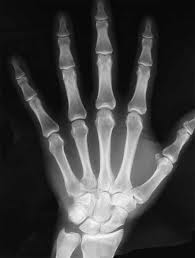Magnesium and calcium ions play an important role in biological reactions. The main pigment for the absorption of light in plants is chlorophyll which contains magnesium.
 X – ray of human hand showing bone.
X – ray of human hand showing bone.
 Antacid tablets containing Calcium.
Calcium
Antacid tablets containing Calcium.
Calcium
This is the chief mineral in the body and is stored in the bones. We only normally absorb around 20–30 percent of the calcium we eat and this also depends on a number of different factors. A higher percentage of calcium is absorbed at low intakes rather than at high intakes, and dietary protein along with an organic form of calcium enhances absorption.
- Absorption of fats by activating pancreatic lipase
- Normal Blood clotting
- Regular heartbeat
- Membrane permeability
- Firmness and elasticity of tissues
- Healing and building of tissues
- Immune system
- Maintaining the pH of the blood
- Muscles, muscle contraction, including the heart
- Nerves and nerve conduction
- Preventing toxic heavy metal build up
- Production and release of certain hormones
- Production of digestive juices including intrinsic factor and bile
- Storage of glycogen
- The body's enzyme system
"Increased intake of calcium can decrease the incidence of hypertension."
"Calcium also lowers the risk of colon cancer and protects against osteoporosis."
Magnesium
Magnesium is considered an antispasmodic and anti–stress mineral. Over 50% of the body's magnesium is stored in the bones. The parathyroid glands influence the rate of magnesium absorption from the small intestine, and the adrenal hormone (aldosterone) regulates its excretion in the urine via the kidneys.
- Brain function and health
- Cardiovascular system health
- Cell strength
- Co–enzyme to many biological processes
- Co–factor in B1 and B6 function
- Digestive enzyme, HCl and bile production
- DNA duplication
- Growth and repair
- Hormones and hormone synthesis
- Immune system
- Maintaining blood pH
- Metabolism
- Muscles
- Nervous system function and health
- Preventing blood clotting
- Removal of ammonia and other metabolic waste from the body
- Cell production of proteins
On the other hand, if our body is deficient and does not get enough magnesium it may lead to a vast number of different problems:
- Abnormal blood clotting
- Abnormal calcium disposition
- Appetite loss
- Blood sugar disorders
- Child hyperactivity
- Confusion and disorientation
- Convulsions or seizures
- Fatigue
- Insomnia
- Involuntary rapid eye movements
- Irregular heartbeat or palpitations
- Muscle cramps
- Nervousness
- Tremors, spasms or tics
"Consuming adequate magnesium can help prevent hypertension."
There are many enzyme reactions that are controlled by alkali and alkaline earth cations. Chemists have not yet fully understood the role of alkali and alkaline earth cations in biology although their importance has been recognized.